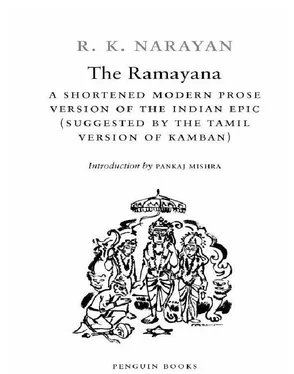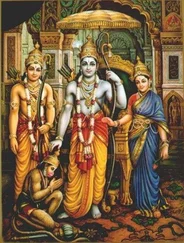Махариши Вальмики - The Ramayana
Здесь есть возможность читать онлайн «Махариши Вальмики - The Ramayana» весь текст электронной книги совершенно бесплатно (целиком полную версию без сокращений). В некоторых случаях можно слушать аудио, скачать через торрент в формате fb2 и присутствует краткое содержание. Жанр: Старинная литература, на английском языке. Описание произведения, (предисловие) а так же отзывы посетителей доступны на портале библиотеки ЛибКат.
- Название:The Ramayana
- Автор:
- Жанр:
- Год:неизвестен
- ISBN:нет данных
- Рейтинг книги:3 / 5. Голосов: 1
-
Избранное:Добавить в избранное
- Отзывы:
-
Ваша оценка:
- 60
- 1
- 2
- 3
- 4
- 5
The Ramayana: краткое содержание, описание и аннотация
Предлагаем к чтению аннотацию, описание, краткое содержание или предисловие (зависит от того, что написал сам автор книги «The Ramayana»). Если вы не нашли необходимую информацию о книге — напишите в комментариях, мы постараемся отыскать её.
The Ramayana — читать онлайн бесплатно полную книгу (весь текст) целиком
Ниже представлен текст книги, разбитый по страницам. Система сохранения места последней прочитанной страницы, позволяет с удобством читать онлайн бесплатно книгу «The Ramayana», без необходимости каждый раз заново искать на чём Вы остановились. Поставьте закладку, и сможете в любой момент перейти на страницу, на которой закончили чтение.
Интервал:
Закладка:
“But have you not heard how my lord has vanquished Kara, Dushana, Virada, and the rest, single-handed?”
“Kara, Virada, and the rest were weaklings possessing neither bows nor armour—not a great task conquering them. Wait until you see, as you soon will, what happens to him when he has to meet the mighty Ravana, who has twenty shoulders!”
“What if he has twenty shoulders? Did not just a two-shouldered man like Parasurama once imprison Ravana till he cried for mercy?”
This statement enraged Ravana; his eyes became bloodshot with anger and he ground his teeth. Gradually he was losing his saintly disguise. Noticing the transformation, Sita began to feel puzzled and presently he loomed over her fearsomely in his natural form. Sita had no courage to utter any word.
Ravana said, “For your stupid statement, I would have crushed and eaten you, except for the fact you are a woman and I want you and will die if I don’t have you. Oh, swanlike one, my ten heads have never bowed to any god in any world. But I will take off my crowns and touch your feet with my brow. Only be my queen and command me what to do.”
Sita covered her ears with her hands. “How dare you speak thus! I am not afraid to lose my life, but if you wish to save yours, run and hide before Rama sees you.”
“Rama’s arrows cannot touch me; you could as well expect a mountain to split at the touch of a straw,” Ravana said. “Be kind to me. I am dying for your love. I will give you a position greater than anything a goddess can have. Have consideration. Have mercy. I prostrate myself before you.”
When Ravana fell to the floor, Sita recoiled and started weeping aloud, “O my lord! O, brother Lakshmana, come and help me.”
At this Ravana, remembering an ancient curse that if he touched any woman without her consent, he would die that instant, dug the ground under Sita’s feet, lifted it off with her, placed it in his chariot, and sped away.
Sita fainted, revived, desperately tried to jump off the chariot, cried, lamented, called upon the trees, birds, and animals and the fairies of the woods to bear witness and report her plight to Rama, and finally cursed Ravana as a coward and a trickster, who had adopted treacherous means only because he was afraid of Rama; otherwise would he not have faced Rama and fought him? Ravana only treated her words as a great joke and laughed at her. “You think too highly of Rama, but I don’t. I do not care to fight him because it’s beneath our dignity to confront a mere human being.”
“Ah, yes, your class are ashamed to contend with humans, but you may covet and treacherously attack a helpless woman.
This is a noble achievement, I suppose! Stony-hearted rakshasas like you do not know what is wrong and what is right. If you have the courage to face my husband, stop your chariot immediately; don’t drive it farther.”
All this only amused Ravana, who laughed and bantered and uttered reckless pleasantries. At this moment, he felt an obstruction in the course of his flight. Jatayu, the great eagle who had promised to guard the children of his old colleague and friend Dasaratha, noticing the danger that had befallen Sita, shouted a challenge and obstructed Ravana’s passage, hurling himself on Ravana with all his might. It was as if a mountain were hitting the speeding chariot. Before starting the actual battle, Jatayu appealed to Ravana to retrace his steps and take Sita back to Panchvati. He said, “You don’t even have to go back; just stop and put her down, and I’ll lead her back safely to her husband and you may run away before Rama comes.”
Ravana laughed at this proposal. “Keep out of my way, you senile bird, go away.”
Jatayu advised him, “Don’t seek your own ruin, and the ruin of your whole clan, class, tribe, and all. Rama’s arrows will end your career, have no doubt about it.”
“Stop chattering away like this,” Ravana commanded. “Let all those heroes you talk about come, bring them all, and I will deal with them. Whatever may happen, I’ll not yield this treasure that I have acquired. . . . She will go with me.”
Sita grew desperate and burst into tears. Jatayu said, “Don’t fear. No harm will come to you. This demon will be destroyed by me. You don’t have to worry about it at all”—and began his attack. The flapping of his enormous wings created the power of a storm, which shook and paralysed both Ravana and his chariot; then he hit and tore with his whole body, beak, and claws, with such force that Ravana’s ensign with the symbol of a veena 9was torn and the flagstaff was in fragments, his crowns were knocked off and fell to the ground, his royal canopy was in tatters, and the chariot was smashed. Ravana parried and hit and used all the weapons in his command, but Jatayu kept up an unrelenting offensive.
Ravana tried to spare Jatayu up to a point. His anger finally rose and he took a special sword (an infallible one gifted to him by Shiva) called “Chandrahasa” and with a couple of flourishes and swings dealt a final blow to Jatayu, lopped off his gigantic wings, and pierced his throat. After Jatayu fell, Ravana picked himself up, abandoned his chariot, placed Sita on his shoulder with the piece of ground beneath her and, exercising his power to fly in the air, carried her off to Lanka.
Meanwhile Jatayu, with an effort of will, kept himself alive until Rama and Lakshmana, searching for Sita, came that way. With his dying breath, Jatayu gave an account of what he had witnessed and said, “Do not despair. You will succeed in the end.” Rama anxiously asked, “In which direction did they go?” But Jatayu was dead before he could answer.
6
VALI
The perfect man takes a false step, apparently commits a moral slip, and we ordinary mortals stand puzzled before the incident. It may be less an actual error of commission on his part than a lack of understanding on ours; measured in Eternity, such an event might stand out differently. But until we attain that breadth of view, we are likely to feel disturbed and question the action. Rama was an ideal man, all his faculties in control in any circumstances, one possessed of an unwavering sense of justice and fair play. Yet he once acted, as it seemed, out of partiality, half-knowledge, and haste, and shot and destroyed, from hiding, a creature who had done him no harm, not even seen him. This is one of the most controversial chapters in the Ramayana.
The characters in the drama that follows are Vali, Sugreeva, Hanuman, and Rama. The action takes place in the mountainous forest regions of Kiskinda, a kingdom ruled and inhabited by monkeys. In the Ramayana, the participants are not only human beings but many others from God’s creation, intelligent, cultured, and with their own achievements of spirit as well as physique: Jambavan was a bear, Jatayu was an eagle, Lakshmana—Rama’s brother—was himself a human incarnation of the Great Serpent Adisesha in whose coils Vishnu rested. Whatever might be the form and shape, when they spoke and acted, their physical appearance passed unnoticed.
Kiskinda was peopled and ruled by what might broadly speaking be named a monkey race; but they were beings endowed with extraordinary intelligence, speech, immeasurable strength and nobility, and were of godly parentage too.
Rama, in his desperate quest of Sita, was journeying southwards and crossed the frontiers of Kiskinda. Although he was an incarnation of Vishnu, the Supreme God, in human form, as we have seen, he was subject to human limitations of understanding and the despairs arising therefrom. Following Sita’s trail by hearsay and hints, he and Lakshmana arrived on the frontiers of Kiskinda. Their entry was not unobserved. The companion and helper of Sugreeva, ruler of the monkey clan, was Hanuman, who will later take his place in the Ramayana as a major character. Hanuman, watching for intruders, noticed Rama and Lakshmana far off on the mountain path. Assuming the shape of a young scholar, he went down and remained hidden behind a tree on their path. When they approached, he observed them closely and reflected within himself. “So noble-looking! Who are they? They are clad in tree bark, hair matted and knotted, ascetics. But they bear enormous bows on their shoulders. Ascetics armed like warriors or warriors clothed in ascetics’ robes? But they still look like—like whom? They appear to be incomparable beings. No way of judging by comparison. Are they gods?—but they look so human.” Hanuman, unable to contain himself, stepped up before them and announced, “I am the son of Vayu and Anjana. I am called Anjaneya (or Hanuman), I am in the service of my chief, Sugreeva, who is the son of the sun god. I welcome you to our kingdom on his behalf.”
Читать дальшеИнтервал:
Закладка:
Похожие книги на «The Ramayana»
Представляем Вашему вниманию похожие книги на «The Ramayana» списком для выбора. Мы отобрали схожую по названию и смыслу литературу в надежде предоставить читателям больше вариантов отыскать новые, интересные, ещё непрочитанные произведения.
Обсуждение, отзывы о книге «The Ramayana» и просто собственные мнения читателей. Оставьте ваши комментарии, напишите, что Вы думаете о произведении, его смысле или главных героях. Укажите что конкретно понравилось, а что нет, и почему Вы так считаете.












